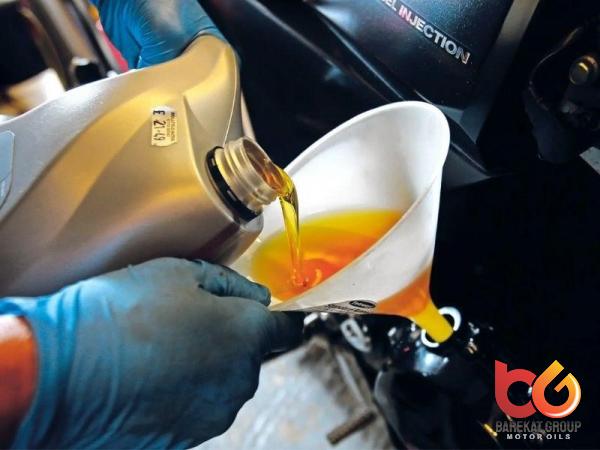An Overview of Industrial Engine Oil Types: Properties, Uses, and Benefits Introduction: Industrial engine oils play a vital role in keeping machinery and engines running smoothly and efficiently. They offer lubrication, cooling, cleaning, and protection against wear and corrosion to enhance the overall performance and longevity of engines operating in a range of industries. In this article, we will examine different types of industrial engine oils, their specific properties, applications, and benefits. 1. Mineral Engine Oil: Mineral engine oil is derived from crude oil through a refining process. It is the most basic and traditional type of engine oil. Mineral oil offers good lubrication and viscosity stability at moderate temperatures, making it suitable for older engines with simpler design structures. However, it may not be able to meet the demands of modern engines that operate under heavy loads and in extreme conditions. Uses: Mineral engine oil is commonly used in stationary engines, manufacturing plants, and applications where engines are subjected to moderate operation conditions. Benefits: – Affordable and readily available. – Good lubrication properties, reducing friction and wear. – Protects against rust and corrosion. 2. Synthetic Engine Oil: Synthetic engine oil is manufactured from chemically modified compounds, resulting in a highly refined product. Synthetic oil offers superior performance and durability, making it ideal for high-performance engines, heavy-duty machinery, and engines operating in extreme temperature conditions. Uses: Synthetic engine oil is widely used in automotive engines, industrial machinery, aviation, racing cars, and high-performance vehicles. Benefits: – Excellent viscosity stability over a wide temperature range.
Engine oil
 – Better lubrication under high loads and extreme conditions. – Enhanced engine cleanliness, reducing sludge and deposits. – Extended oil change intervals, reducing maintenance costs. – Improved fuel efficiency. – Increased engine life. 3. Semi-Synthetic Engine Oil: Semi-synthetic engine oil, also known as synthetic blend, is a combination of mineral and synthetic oils. This type of oil combines the benefits of both mineral and synthetic oils and provides a balance between performance and affordability. Uses: Semi-synthetic engine oil is often used in applications where the engine’s workload varies, such as in passenger vehicles, light-duty trucks, and machinery subjected to moderate operating conditions. Benefits: – Improved oxidation stability compared to mineral oil. – Enhanced engine protection and cleanliness. – Extended oil change intervals. – Better performance in extreme temperatures compared to mineral oil. 4. High Mileage Engine Oil: High mileage engine oil is specifically formulated for vehicles with higher mileage, typically above 75,000 miles. It contains additives that help to reduce oil consumption, minimize leaks, and rejuvenate seals and gaskets that may have worn with time. Uses: High mileage engine oil is commonly used in older vehicles or those with higher mileage to address common issues associated with aging engines. Benefits: – Reduces oil burn-off and consumption. – Rejuvenates seals and gaskets, reducing leaks. – Minimizes engine wear and prolongs engine life. – Helps maintain engine performance in older vehicles. 5. Racing Engine Oil: Racing engine oil is designed for high-performance racing engines that operate under extreme conditions such as high speeds, high temperatures, and heavy loads.
– Better lubrication under high loads and extreme conditions. – Enhanced engine cleanliness, reducing sludge and deposits. – Extended oil change intervals, reducing maintenance costs. – Improved fuel efficiency. – Increased engine life. 3. Semi-Synthetic Engine Oil: Semi-synthetic engine oil, also known as synthetic blend, is a combination of mineral and synthetic oils. This type of oil combines the benefits of both mineral and synthetic oils and provides a balance between performance and affordability. Uses: Semi-synthetic engine oil is often used in applications where the engine’s workload varies, such as in passenger vehicles, light-duty trucks, and machinery subjected to moderate operating conditions. Benefits: – Improved oxidation stability compared to mineral oil. – Enhanced engine protection and cleanliness. – Extended oil change intervals. – Better performance in extreme temperatures compared to mineral oil. 4. High Mileage Engine Oil: High mileage engine oil is specifically formulated for vehicles with higher mileage, typically above 75,000 miles. It contains additives that help to reduce oil consumption, minimize leaks, and rejuvenate seals and gaskets that may have worn with time. Uses: High mileage engine oil is commonly used in older vehicles or those with higher mileage to address common issues associated with aging engines. Benefits: – Reduces oil burn-off and consumption. – Rejuvenates seals and gaskets, reducing leaks. – Minimizes engine wear and prolongs engine life. – Helps maintain engine performance in older vehicles. 5. Racing Engine Oil: Racing engine oil is designed for high-performance racing engines that operate under extreme conditions such as high speeds, high temperatures, and heavy loads.
Specifications of Engine oil
 These oils are formulated to provide exceptional lubrication, cooling, and protection against wear under extreme stress. Uses: Racing engine oil is exclusively used in professional racing vehicles, such as Formula One, NASCAR, and drag racing cars. Benefits: – Exceptional high-temperature stability and viscosity control. – Excellent wear protection under extreme conditions. – Superior shear stability. – Combats the formation of sludge and deposits. – Fast circulation, ensuring immediate lubrication during high-speed periods. Conclusion: Industrial engine oils are essential for maintaining the performance of engines and machinery across a range of industries. The choice of engine oil type depends on the specific requirements of the engine, operating conditions, and budget constraints. By understanding the different types of industrial engine oils and their respective benefits, businesses can make informed decisions when selecting engine oils to ensure optimum performance and longevity of their equipment.I. Importance of Engine Oil in Industrial Applications In any industrial setting, the proper lubrication and maintenance of engines and machinery are crucial to ensure optimal performance, efficiency, and longevity. Engine oil plays a significant role in achieving these objectives by providing lubrication, cooling, cleaning, and protection against wear and corrosion. Neglecting the quality and type of engine oil used can result in diminished performance, increased maintenance costs, decreased productivity, and even potential machine breakdowns. Therefore, it is essential for businesses to understand the different types of industrial engine oils available and their specific properties, applications, and benefits. II. Mineral Engine Oil: A Cost-Effective Option for Moderate Applications Mineral engine oil, derived from crude oil through a refining process, is the most basic and traditional type of engine oil. Its primary advantage is its affordability and widespread availability. Mineral oil offers good lubrication and viscosity stability at moderate temperatures, making it suitable for older engines with simpler design structures. It provides effective lubrication by reducing friction and wear, while also protecting against rust and corrosion. As such, mineral engine oil finds common use in stationary engines, manufacturing plants, and applications where engines are subjected to moderate operational conditions.
These oils are formulated to provide exceptional lubrication, cooling, and protection against wear under extreme stress. Uses: Racing engine oil is exclusively used in professional racing vehicles, such as Formula One, NASCAR, and drag racing cars. Benefits: – Exceptional high-temperature stability and viscosity control. – Excellent wear protection under extreme conditions. – Superior shear stability. – Combats the formation of sludge and deposits. – Fast circulation, ensuring immediate lubrication during high-speed periods. Conclusion: Industrial engine oils are essential for maintaining the performance of engines and machinery across a range of industries. The choice of engine oil type depends on the specific requirements of the engine, operating conditions, and budget constraints. By understanding the different types of industrial engine oils and their respective benefits, businesses can make informed decisions when selecting engine oils to ensure optimum performance and longevity of their equipment.I. Importance of Engine Oil in Industrial Applications In any industrial setting, the proper lubrication and maintenance of engines and machinery are crucial to ensure optimal performance, efficiency, and longevity. Engine oil plays a significant role in achieving these objectives by providing lubrication, cooling, cleaning, and protection against wear and corrosion. Neglecting the quality and type of engine oil used can result in diminished performance, increased maintenance costs, decreased productivity, and even potential machine breakdowns. Therefore, it is essential for businesses to understand the different types of industrial engine oils available and their specific properties, applications, and benefits. II. Mineral Engine Oil: A Cost-Effective Option for Moderate Applications Mineral engine oil, derived from crude oil through a refining process, is the most basic and traditional type of engine oil. Its primary advantage is its affordability and widespread availability. Mineral oil offers good lubrication and viscosity stability at moderate temperatures, making it suitable for older engines with simpler design structures. It provides effective lubrication by reducing friction and wear, while also protecting against rust and corrosion. As such, mineral engine oil finds common use in stationary engines, manufacturing plants, and applications where engines are subjected to moderate operational conditions.
Buy Engine oil
 III. Synthetic Engine Oil: Unparalleled Performance and Durability Synthetic engine oil, on the other hand, is engineered through the chemical modification of compounds, resulting in a highly refined product. Synthetic oil offers superior performance and durability, making it ideal for high-performance engines, heavy-duty machinery, and engines operating in extreme temperature conditions. Its viscosity stability over a wide temperature range ensures optimal lubrication even under high loads and extreme conditions. Synthetic engine oil boasts enhanced engine cleanliness, reducing the accumulation of sludge and deposits that can hinder performance. It also allows for extended oil change intervals, reducing maintenance costs, improving fuel efficiency, and increasing engine life. As a result, synthetic engine oil finds extensive use in automotive engines, industrial machinery, aviation, racing cars, and high-performance vehicles. IV. Semi-Synthetic Engine Oil: The Perfect Balance Semi-synthetic engine oil, also known as synthetic blend, combines the benefits of both mineral and synthetic oils, striking a balance between performance and affordability. It provides improved oxidation stability compared to mineral oil, increasing engine protection and cleanliness. Semi-synthetic engine oil also allows for extended oil change intervals while performing better in extreme temperatures compared to its mineral counterpart. As a result, it is often used in applications where the engine workload varies, such as in passenger vehicles, light-duty trucks, and machinery subjected to moderate operating conditions. V. High Mileage Engine Oil: Addressing the Needs of Older Vehicles High mileage engine oil is specifically formulated for vehicles with higher mileage, typically above 75,000 miles. It contains additives that help reduce oil consumption, minimize leaks, and rejuvenate seals and gaskets that may have worn with time. This type of engine oil is commonly used in older vehicles or those with higher mileage to address common issues associated with aging engines. High mileage engine oil reduces oil burn-off and consumption, rejuvenates seals and gaskets to minimize leaks, minimizes engine wear, and prolongs engine life. It helps maintain engine performance and mitigates the potential for costly repairs or replacements in older vehicles. VI. Racing Engine Oil: Meeting the Demands of Extreme Conditions Racing engine oil is specifically designed for high-performance racing engines that operate under extreme conditions, including high speeds, high temperatures, and heavy loads. These oils are formulated to provide exceptional lubrication, cooling, and protection against wear under extreme stress. Racing engine oil exhibits exceptional high-temperature stability and viscosity control, ensuring consistent lubrication in demanding racing conditions. It also offers exceptional wear protection, combating the formation of sludge and deposits that can decrease performance.
III. Synthetic Engine Oil: Unparalleled Performance and Durability Synthetic engine oil, on the other hand, is engineered through the chemical modification of compounds, resulting in a highly refined product. Synthetic oil offers superior performance and durability, making it ideal for high-performance engines, heavy-duty machinery, and engines operating in extreme temperature conditions. Its viscosity stability over a wide temperature range ensures optimal lubrication even under high loads and extreme conditions. Synthetic engine oil boasts enhanced engine cleanliness, reducing the accumulation of sludge and deposits that can hinder performance. It also allows for extended oil change intervals, reducing maintenance costs, improving fuel efficiency, and increasing engine life. As a result, synthetic engine oil finds extensive use in automotive engines, industrial machinery, aviation, racing cars, and high-performance vehicles. IV. Semi-Synthetic Engine Oil: The Perfect Balance Semi-synthetic engine oil, also known as synthetic blend, combines the benefits of both mineral and synthetic oils, striking a balance between performance and affordability. It provides improved oxidation stability compared to mineral oil, increasing engine protection and cleanliness. Semi-synthetic engine oil also allows for extended oil change intervals while performing better in extreme temperatures compared to its mineral counterpart. As a result, it is often used in applications where the engine workload varies, such as in passenger vehicles, light-duty trucks, and machinery subjected to moderate operating conditions. V. High Mileage Engine Oil: Addressing the Needs of Older Vehicles High mileage engine oil is specifically formulated for vehicles with higher mileage, typically above 75,000 miles. It contains additives that help reduce oil consumption, minimize leaks, and rejuvenate seals and gaskets that may have worn with time. This type of engine oil is commonly used in older vehicles or those with higher mileage to address common issues associated with aging engines. High mileage engine oil reduces oil burn-off and consumption, rejuvenates seals and gaskets to minimize leaks, minimizes engine wear, and prolongs engine life. It helps maintain engine performance and mitigates the potential for costly repairs or replacements in older vehicles. VI. Racing Engine Oil: Meeting the Demands of Extreme Conditions Racing engine oil is specifically designed for high-performance racing engines that operate under extreme conditions, including high speeds, high temperatures, and heavy loads. These oils are formulated to provide exceptional lubrication, cooling, and protection against wear under extreme stress. Racing engine oil exhibits exceptional high-temperature stability and viscosity control, ensuring consistent lubrication in demanding racing conditions. It also offers exceptional wear protection, combating the formation of sludge and deposits that can decrease performance.
Engine oil + buy and sell
 Furthermore, racing engine oil features superior shear stability and fast circulation, ensuring immediate lubrication during high-speed periods, which is crucial in professional racing settings such as Formula One, NASCAR, and drag racing cars. VII. Choosing the Right Industrial Engine Oil for Optimal Performance Selecting the appropriate engine oil type for industrial applications involves considering various factors such as engine design, operating conditions, workload, and budget constraints. Manufacturers and businesses must review the specifications and recommendations provided by engine manufacturers to ensure compatibility and optimal performance. Consultation with industry experts and technicians can also provide valuable insights into the specific requirements of the machinery and the most suitable engine oil type. By investing in the correct engine oil, businesses can maximize equipment efficiency, minimize maintenance costs, and extend the service life of their engines, leading to improved productivity and reduced downtime. VIII. Regular Oil Analysis and Maintenance for Prolonged Engine Life Irrespective of the engine oil type used, regular oil analysis and maintenance are essential for the longevity and effectiveness of machinery. Routine oil analysis allows for the detection of contaminants, wear metals, viscosity changes, and other anomalies that can impact engine performance. Through this proactive approach, businesses can identify potential issues early on and take corrective actions, preventing costly repairs or machinery failures. Furthermore, adhering to manufacturer-recommended maintenance schedules, including oil changes and filter replacements, ensures that engines operate at optimal levels for prolonged periods. IX. Environmental Considerations: Recycling and Disposal of Engine Oil As industries focus increasingly on sustainability and environmental responsibility, proper recycling and disposal of used engine oil have become imperative. Used engine oil can be recycled and re-refined into new engine oil or other petroleum-based products. Many countries have established programs and facilities to support the collection and recycling of used engine oil, ensuring its safe disposal and reducing environmental pollution. Businesses should actively participate in these initiatives by disposing of used engine oil in designated collection centers or by engaging professional recycling services. X. Conclusion: Enhancing Performance and Extending Engine Life Industrial engine oils play a vital role in maintaining and enhancing the performance of engines and machinery in various industries. The choice of engine oil type depends on the specific needs and requirements of the engine, operating conditions, and budget constraints. Mineral oil offers affordability and moderate performance, while synthetic oil provides unparalleled performance and durability. Semi-synthetic oil blends the benefits of both mineral and synthetic oils, providing a balanced option. High mileage oil addresses the needs of older vehicles, while racing oil is specifically formulated for high-performance racing engines. By understanding the properties, uses, and benefits of industrial engine oils, businesses can make informed decisions to optimize the performance and longevity of their equipment, leading to increased productivity and reduced maintenance costs.
Furthermore, racing engine oil features superior shear stability and fast circulation, ensuring immediate lubrication during high-speed periods, which is crucial in professional racing settings such as Formula One, NASCAR, and drag racing cars. VII. Choosing the Right Industrial Engine Oil for Optimal Performance Selecting the appropriate engine oil type for industrial applications involves considering various factors such as engine design, operating conditions, workload, and budget constraints. Manufacturers and businesses must review the specifications and recommendations provided by engine manufacturers to ensure compatibility and optimal performance. Consultation with industry experts and technicians can also provide valuable insights into the specific requirements of the machinery and the most suitable engine oil type. By investing in the correct engine oil, businesses can maximize equipment efficiency, minimize maintenance costs, and extend the service life of their engines, leading to improved productivity and reduced downtime. VIII. Regular Oil Analysis and Maintenance for Prolonged Engine Life Irrespective of the engine oil type used, regular oil analysis and maintenance are essential for the longevity and effectiveness of machinery. Routine oil analysis allows for the detection of contaminants, wear metals, viscosity changes, and other anomalies that can impact engine performance. Through this proactive approach, businesses can identify potential issues early on and take corrective actions, preventing costly repairs or machinery failures. Furthermore, adhering to manufacturer-recommended maintenance schedules, including oil changes and filter replacements, ensures that engines operate at optimal levels for prolonged periods. IX. Environmental Considerations: Recycling and Disposal of Engine Oil As industries focus increasingly on sustainability and environmental responsibility, proper recycling and disposal of used engine oil have become imperative. Used engine oil can be recycled and re-refined into new engine oil or other petroleum-based products. Many countries have established programs and facilities to support the collection and recycling of used engine oil, ensuring its safe disposal and reducing environmental pollution. Businesses should actively participate in these initiatives by disposing of used engine oil in designated collection centers or by engaging professional recycling services. X. Conclusion: Enhancing Performance and Extending Engine Life Industrial engine oils play a vital role in maintaining and enhancing the performance of engines and machinery in various industries. The choice of engine oil type depends on the specific needs and requirements of the engine, operating conditions, and budget constraints. Mineral oil offers affordability and moderate performance, while synthetic oil provides unparalleled performance and durability. Semi-synthetic oil blends the benefits of both mineral and synthetic oils, providing a balanced option. High mileage oil addresses the needs of older vehicles, while racing oil is specifically formulated for high-performance racing engines. By understanding the properties, uses, and benefits of industrial engine oils, businesses can make informed decisions to optimize the performance and longevity of their equipment, leading to increased productivity and reduced maintenance costs.
Your comment submitted.